Following TfL’s decision that Private Hire Vehicles (PHVs) will no longer be exempt from paying the weekday congestion charge for driving in Central London, an emergency meeting was called by the London Private Hire Car Association (LPHCA) on the 6th February 2019. While the headline topic surrounded Congestion Charging for PHVs, the meeting also covered the latest on operator fees & the English language test requirements. This led to Steve Wright, Founder and Chairman of LPHCA, highlighting several clear examples that in his opinion demonstrate bias on TfL’s part towards the Black Cab trade. Mr Wright was keen to voice his admiration of the Black Cab trade – due to the completion of the vigorous knowledge qualifications, the high level of service they provide and he fully acknowledged the logic behind the trade having the right to use bus lanes and ranks. He also stated his belief that app operators are essentially plying for hire. However, he feels that the PH industry is receiving disproportionately harsh treatment from the regulator compared to their black cab counterparts. Here are some of the discrepancies he raised during the emergency meeting.
Congestion Charging
Mayor Sadiq Khan confirmed in December that as of April 8th 2019, Private Hire Vehicles (PHVs), will have pay the weekday congestion charge for driving in Central London. Deemed as being urgently needed to reduce the number of vehicles on London’s roads, TfL had made a U-turn on PHV owners, drivers and registered keepers, who have been exempt from paying the Congestion Charge since the zone was introduced by Ken Livingstone’s mayoral administration. 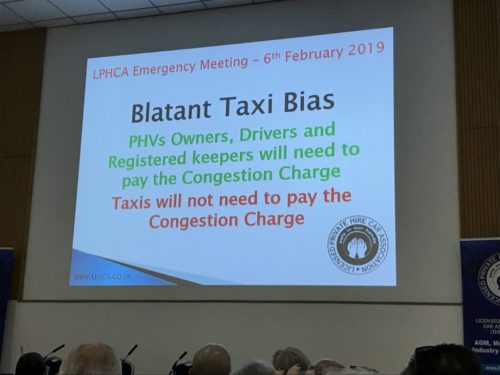 While it was accepted that the swift emergence of mobile apps has massively contributed to the rising number of PHV driver numbers and congestion in the capital, the rest of the industry believe they have been penalised for the small number of app operators ‘effectively plying for hire’.
While it was accepted that the swift emergence of mobile apps has massively contributed to the rising number of PHV driver numbers and congestion in the capital, the rest of the industry believe they have been penalised for the small number of app operators ‘effectively plying for hire’.
LPHCA Chair Steve Wright says that “App operators are effectively plying for hire and clogging up the roads. TfL have it within their power to prevent that by fining drivers for entering the CCZ without a prebooked fare. There is no need to penalise the rest of the industry.” pic.twitter.com/8FHsI4g3OD — Plan Insurance (@PlanInsurance) February 6, 2019
Meanwhile, the Black Taxi exemption has been maintained on the basis that all taxis come with wheelchair accessibility, however, new rules will reduce the maximum taxi age from 15 years to 12 years by 2022.

ULEZ charges
The next topic centred around the Ultra Low Emission Zone. From the 8th April 2019, tight exhaust emission standards will be enforced in London and PHVs will be subject to a £12.50 per day ULEZ charge to drive into the capital. This will run concurrently with the congestion charge, meaning drivers could face having to pay up to £24 a day to drive in the congestion zone. Mr Wright pointed out that London Black Cabs will be exempt from this charge, despite recent headlines in the national press regarding research that found some of the most common black cabs emit up to 30 times as much pollution as personal cars the same age. The Mayor’s spokesman said at the time of the decision:
“As part of our bold plans to tackle air pollution, TfL are using the licensing powers they have to clean up London’s black cabs. “From 2018, all new black cabs will have to be zero emission capable – plug-in or hybrid vehicles. TfL are also providing £40 million in funding to help retire older black cabs more quickly.”
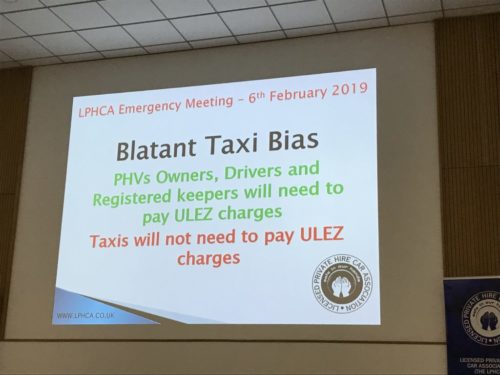
Operator fees
Operator fees that are charged for licensing, compliance and enforcement activity have faced a rise very few could have predicted. Labelled as the way to ‘drive up industry standards’, the new fee structure will replace the current two-bands system with a structure of “nine-tiers” – with charges ranging from £2,000 for those with 10 vehicles or fewer, to £2,900,000 for the largest operators. The attendees were informed that any black cab fleet operator that purely rents vehicles to drivers without providing work are not subject to operator fees. The controversial new PH operators fee structure has led to protests from the industry and has already forced operators to rethink their growth strategies to avoid being hit with higher rates. The table below is a breakdown of the London Operator License Fees: 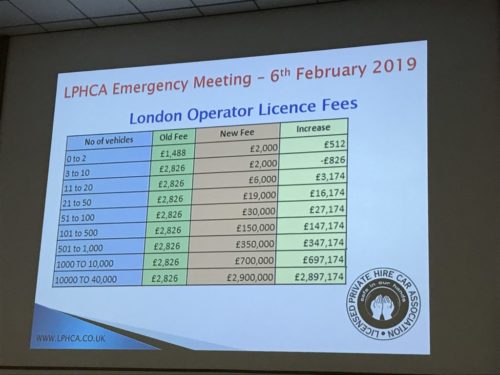
PHV Operators customer-facing staff need criminal record checks.
Another piece of TfL legislation requires PHV Operators to ensure all their customer-facing staff have – or have proof they have applied for – a basic criminal record check. If this isn’t done by operators, they run the risk of having their licence potentially revoked by the licensing authorities. Steve Wright explained that the taxi operator’s staff do not need a Criminal Record Check. 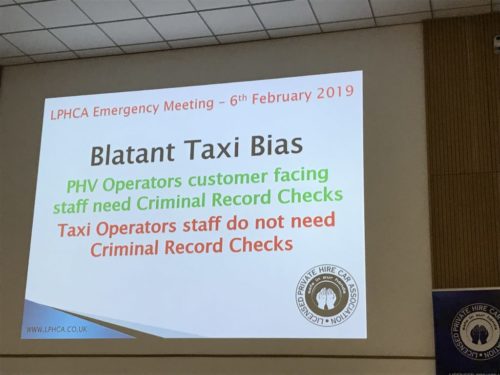
English language requirement
An English language test is required for new drivers or those wanting to renew their PH driver’s license. There have been several complaints made surrounding the cost to take this test and its level of difficulty. 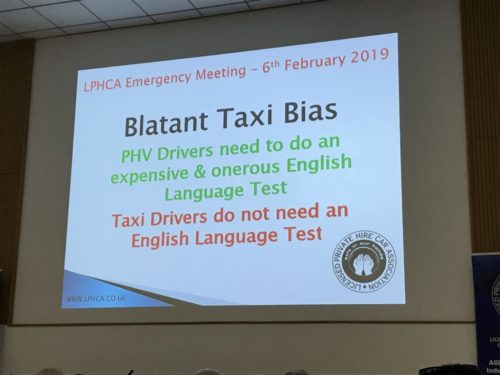
Are Black cab drivers advantages down to their extensive training?
As Steve Wright acknowledges, it cannot be understated that London Black Cab drivers are provided with distinct market advantages that result from completing the knowledge in order to become a London taxi driver. The extensive training, checks and study needed to pass the stringent test to become a black taxi driver in London are far more robust in assessing driver ability than the tests required in the Private Hire industry. On average, it takes around three to four years for a person to learn the Knowledge, which is assessed by an oral and written exam on navigating around London. Research suggests that the typical applicant studies for around 15 to 30 hours’ a week. Knowledge schools for students can cost around £40 a month.
The relationship between TfL and the Private Hire Industry
The relationship between TfL and the Private Hire Industry has been largely hostile, which has led to some high profile protests in recent weeks. The impact of digital technology has led to the number of PH drivers operating within the congestion charge zone escalating dramatically. TfL believes this has been a leading cause of congestion in London and it appears that is the reason why they have put regulations in place over and above those recommended by DEFRA to try and ‘clean up London’. With all the new legislation being put in place, it’s easy to see why Steve Wright feels the need to defend his membership. He believes the black cab trade has had many successes in its battles against TfL due to their greater lobbying power which stems from cabbies joining the various trade unions in large numbers. He cited this as a reason why many more private hire operators should join the LPHCA. Though the Black Cab trade would argue that TfL’s rulings have still impacted their industry, as they have been forced to install card payment infrastructure into their cabs, been banned from key routes such as Tottenham Court Road and have had no new diesel taxis licensed since the end of 2017, in an effort to make drivers switch over to Zero Emission Capable taxis.  ]]>
]]>

